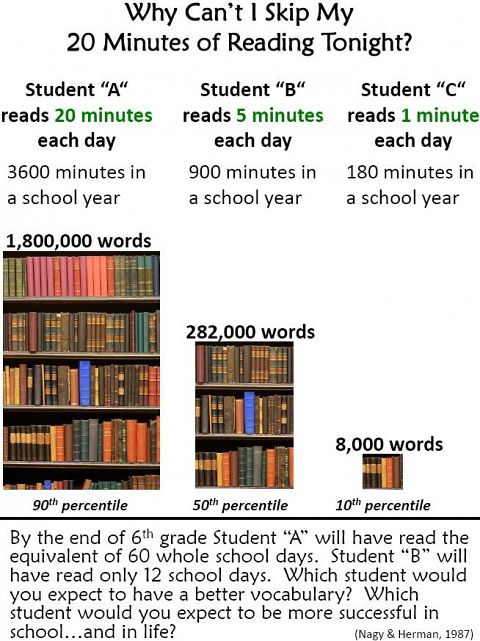Our ‘Wednesday for Parents’ mini-series on helping with homework continues this week with advice on helping your child with their reading homework. During World Book Day, we found this statistic that really helps to emphasise how important your child’s reading homework is:
So how can you help with homework?
- In the senior end of the school, your child will generally not need you to ‘hear’ their reading every single day. However, it is important that you check that they understand what they’ve read. Ask them to tell you five things that they read (and make sure that they’re not from the same page!)
- In the junior end of the school, it’s really important that your child focuses on fluency. This means that it’s not enough for your child to be able to read every word by itself. It’s also important for them to read all the words smoothly as a sentence.
- It’s important that your child practises reading with expression. Encourage them to play around with silly voices for characters and ask them how a character might have said a certain piece of dialogue.
- Junior classes also use wordwalls to increase vocabulary. Read over each word (and mix up the order!) until your child can say it confidently. Your child should also try to use the word in a sentence to show you that they know what it means.
- For age-specific tips, check out Helpmykidlearn.ie for activities. We profiled helpmykidlearn.ie in a previous ‘Wednesday for Parents’ and a number of parents commented on how useful they found it. Reading activities for 5-7 year olds can be found here. Reading activities for 8-9 year olds can be found here. Reading activities for 10-12 year olds can be found here.
We use First Steps in St Peter’s and a main focus of ours is developing reading comprehension skills in the students. Here are sample questions for each skill so that you can help your child to practise, as they do their reading homework:
- Predicting: What do you think will happen next? What will that character do next?
- Making connections: Does this story remind you of another book/story in the newspaper/film/TV programme?
- Comparing: Are the two main characters alike or different? Why do you say that?
- Inferring: If you read between the lines, what do you think the author was trying to say in this chapter?
- Creating images: When you read this, what can you see/hear in your mind?
- Self-questioning: Encourage your child to formulate ‘I wonder’ statements – e.g. “I wonder does the author mean..’
- Summarising and paraphrasing: In your own words, what do you think the story was about?
- Skimming: Glancing through the text, what do you think this story is about?
- Scanning: Scanning through the piece, where do you think this story is set? Why?
- Determining importance: What is the main point of that paragraph?
And now, over to you! What are your tips for helping your child with their homework?










3:57 pm on March 13th, 2014
This is excellent I must get something similar for my own school website – your new website is amazing and I think I need to kidnap your IT experts for a while so I can learn how to do all the fabulous things your able to do!!!! #I’mabeginner
3:59 pm on March 13th, 2014
Hi Iseult. Ms. Sexton leads the wonderful work on our Wednesday for Parents posts. Feel free to adapt the idea! We’re all learning from each other through blogging and twitter, it’s great! 🙂
Thanks for the lovely comments, and do keep in touch!